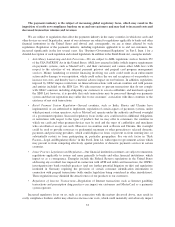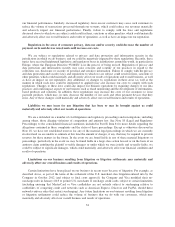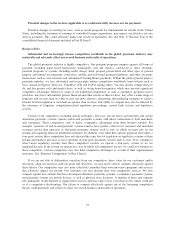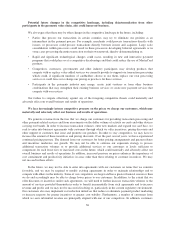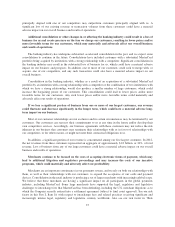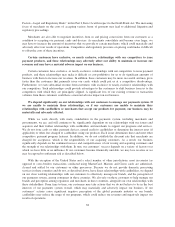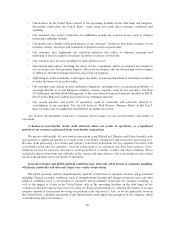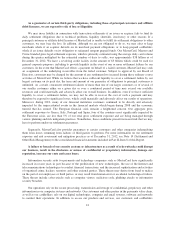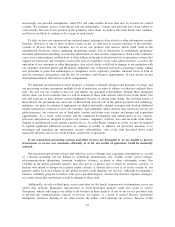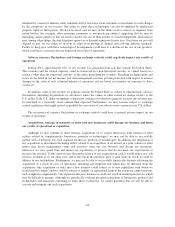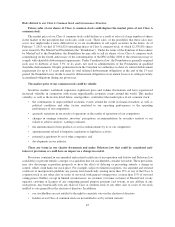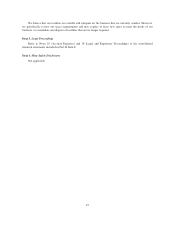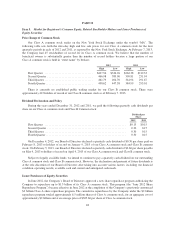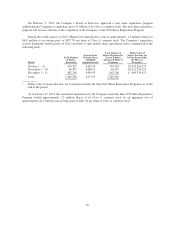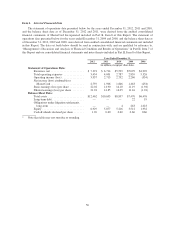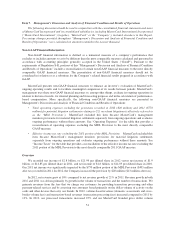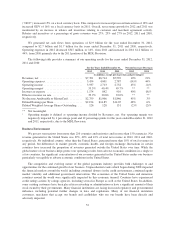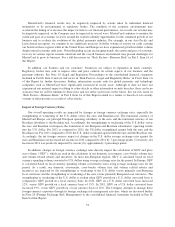MasterCard 2012 Annual Report Download - page 47
Download and view the complete annual report
Please find page 47 of the 2012 MasterCard annual report below. You can navigate through the pages in the report by either clicking on the pages listed below, or by using the keyword search tool below to find specific information within the annual report.intrinsic importance of our processing systems to our business, any interruption or degradation could adversely
affect the perception of the reliability of products carrying our brands and materially reduce our results of
operations.
Account data breaches involving card data stored, processed or transmitted by us or third parties
could adversely affect our reputation and results of operations.
We, our issuers and acquirers, merchants and other third parties process, transmit or store cardholder
account and other information in connection with payment cards and devices. In addition, our customers may
sponsor (or we may certify as PCI-compliant) third-party processors to process transactions generated by cards
carrying our brands and merchants may use third parties to provide services related to card use. A breach of the
systems on which sensitive cardholder data and account information are processed, transmitted or stored could
lead to fraudulent activity involving cards carrying our brands, damage our reputation and lead to claims against
us, as well as subject us to regulatory actions. We routinely encounter account data compromise events, some of
which have been high profile, involving merchants and third-party payment processors that process, store or
transmit payment card data, which affect millions of MasterCard, Visa, Discover, American Express and other
types of cardholders. These events typically involve external agents hacking the merchants’ or third-party
processors’ systems and installing malware to compromise the confidentiality and integrity of the servers. As a
result of such data security breaches, we may be subject to reputational damage and/or lawsuits involving
payment cards carrying our brands. While most of these lawsuits do not involve direct claims against us, we
could face damage claims in various circumstances, which, if upheld, could materially and adversely affect our
results of operations. Damage to our reputation or that of our brands resulting from an account data breach of
either our systems or the systems of our customers, merchants and other third parties could decrease the use and
acceptance of our cards and other payment devices, which in turn could have a material adverse impact on our
transaction volumes, results of operations and prospects for future growth, or increase our costs by leading to
additional regulatory burdens being imposed upon us.
An increase in fraudulent activity using our cards could lead to reputational damage to our brands
and/or regulatory intervention, which could reduce the use and acceptance of our cards and other
payment devices.
Criminals are using increasingly sophisticated methods to capture cardholder account information to engage
in illegal activities such as counterfeiting or other fraud. As outsourcing and specialization become commonplace
in the payments industry, there are more third parties involved in processing transactions using our cards.
Increased fraud levels involving our cards, or misconduct or negligence by third parties processing or otherwise
servicing our cards, could lead to regulatory intervention, such as enhanced security requirements, as well as
damage to our reputation, which could reduce the use and acceptance of our cards or increase our compliance
costs, and thereby have a material adverse impact on our business.
Rapid technological developments in our industry present both operational and legal challenges
(including potential intellectual property exposure) which could impact our results of operations or limit
our future growth.
The payments industry is subject to rapid and significant technological changes, including continuing
developments of technologies in the areas of smart cards and devices, radio frequency and proximity payment
devices (such as contactless payment devices), electronic commerce and mobile commerce, among others. We
cannot predict the effect of technological changes on our business. We rely in part on third parties, including
some of our competitors and potential competitors, for the development of and access to new technologies. We
expect that new services and technologies applicable to the payments industry will continue to emerge, and these
new services and technologies may be superior to, or render obsolete, the technologies we currently use in our
programs and services. In addition, our ability to adopt new services and technologies that we develop may be
43


